- Home
- Cynthia Kadohata
Checked Page 10
Checked Read online
Page 10
My skates are getting small, and my toes are starting to hurt. But I don’t mention it; there’s no money for new skates. I also need a new stick—mine has lost its pop—but no way I’m mentioning that either, ’cause high-end sticks cost two hundred or more. Sticks are super hard to choose, ’cause they all have a different curve and different angle and different flex and different weight, among other things. But don’t even get me started on sticks, ’cause they drive me insane. Someday I’m going to find the perfect stick. Hasn’t happened yet.
A lot of guys happen to turn up at the rink, so we all get together for an informal half-ice scrimmage. Man, it feels good! Everybody oohs and aahs at my dad’s skating, and people gather in the stands to watch us. I’m not on Dad’s team, ’cause I’m supercompetitive and I like to try to beat his butt. A couple of times he hits a slap shot from way out that rockets into the net, causing applause and cheers even from the opposing players. After he establishes dominance, he lets everybody else play their game—he swoops in, grabs the puck, and immediately passes to the other skaters so they can score and puck-handle.
At one point I check Dad, even though nobody ever checks each other in scrimmages like this. I know checking isn’t allowed until you’re thirteen, but I do it anyway to surprise him. He is surprised and momentarily loses the puck, but he immediately takes two powerful strides and catches up with me. I try to flip the puck to someone else, but Dad bats it out of the air. No mercy! When it touches the ice, he hits a slap shot that unfortunately caroms into one of the guys, who doubles over in pain. We all rush over, but after a couple of minutes of leaning over, the guy’s all good. Last year I had the hardest shot on the team, but I’m probably forty miles an hour behind my dad. His shot is scary hard, and his skating is scary good even as an old guy . . . older guy.
When the scrimmage ends, we all gulp down water together, and the other skaters ask Dad about his background. When they hear he played three weeks in the NHL, you can see they’re halfway between wanting to bow down and playing it totally cool. I feel so proud of him, but I also know making the bigs for just three weeks isn’t all good. Dad once said that the hardest year of his life was after those three weeks, when he got sent back down and he realized that was it: his NHL dream had ended. But those three weeks, being out there on the ice, even as a fourth liner in garbage time, was so much fun he felt really filled up for those few games he played in. I guess it’s pretty amazing sitting on the bench surrounded by fifteen thousand people. He’d started playing hockey at seven and made the NHL at twenty-four, so fifteen years after he started. And he said those fifteen years of hard work were worth it for those three weeks. At the same time, it was sad, ’cause when he got to the NHL, he went from being the best player on his team to the worst, and he realized for the first time that he just wasn’t good enough.
Now, watching the guys gathered around Dad as he talks about what champion trash talkers some of those NHL players are, I think about Jae-won and Jesus Acosta and me, going after the same dream my dad chased. Is the NHL really a possibility when I don’t have one truly amazing skill like Jae-won and Jesus? At the same time, Dad has told me many times that it is possible, so I’m going for it.
Dad is talking about the time a so-so NHL player hit him so hard he went flying five feet. “I thought I was strong, but man, I was shocked how strong this dude was. It’s a whole different level.”
My dad can still bench-press four hundred, but he said during his heyday he could do four fifty, which makes him a beast. I don’t do weights yet ’cause Dad thinks I’m too young.
Stick time is over, so a few guys knock gloves with Dad, and we go change in the locker room. Coming out of the showers is a totally naked man, which I’ve actually never seen before. He’s hairy! Whoa, next time I’m changing in one of the locker rooms without a shower! I turn my head away and say softly to Dad, “I think I need therapy now.” He chuckles.
On the car ride home, I stick my head out the open window like I’m Sinbad. The warm air hits my face, and for just a minute I get this sense like I know exactly how my dog feels when his head is out the window. Just taking in the smells, appreciating the breeze. It’s not thinking, it’s experiencing. Maybe it’s the same way as when I’m on the ice. I mean, I’m thinking out there, but things are moving so fast it’s not normal thinking.
“We’ve got to get you lower when you skate,” Dad is saying as I bring my head in. “That’ll be one of the things we focus on in AAA. When you reach bantam, you’re gonna need to be low when you check and when someone checks you. You want to be in a position of power at all times. Bantam is unforgiving at the elite level. By second-year bantam, you’ll be playing against kids who are six feet three, two hundred pounds.”
Fear of bantam—checking!—flashes through my whole body, and I close my eyes to shake it off. When I open my eyes, I spot a man hitting a woman on the sidewalk. “Dad!” I say, but he’s already swooping to the side of the road, shouting, “Stay in the car!” to me as he rushes out. My heart pounds, and I hear what sounds like a waterfall in my head. The man is on top, pummeling—pummeling—the woman. Dad pulls off the man, who swirls around and starts to rush Dad. Dad gut-punches him, and when he folds over I realize I should be calling 911, so I do. The woman lies unmoving on the sidewalk. Then the man, who seemed to be in pain, abruptly rams into my father, and I feel sick to my stomach. I stumble out of the car and run forward. “Dad!”
Dad turns his head, giving the guy a chance to hit him in the ear. They tumble to the ground, wrestling. A woman wraps her arms around me. “Stand back, hon,” she says.
Dad has the guy on his stomach, with his left arm twisted behind his back. “Police officer!”
The man is screaming, “You’re breaking my arm!”
“Then hold still!”
“YOU’RE BREAKING MY ARM!”
Then the guy seems to relax his body, and Dad loosens his grip. Dad makes the guy lie on the ground facedown until the cops and ambulance arrive. I notice that just about every single person who has gathered around is filming on their phones.
“That arm twist was definitely harder than necessary,” I hear one man saying as he comes in closer with his phone.
Another man says, “The cop sucker punched him.”
But thankfully someone else says, “Aw, come on, man, you saw he had to do it, the guy rushed him.”
“Go sit with the lady until the ambulance comes,” Dad says to me. “Did you call 911?”
“Yeah, in the car.” He has told me a million times that if I ever see anything awful going down, call 911 before doing anything else, and be a good witness. He says when I’m older, I can think about helping.
I approach the woman on the sidewalk and kneel beside her. “Ma’am, are you okay?” I ask. I reach out, draw my arm back, and reach out again to touch her shoulder. She’s Asian, maybe Thai, and small. Her nose is punched off-center, and there’s blood dribbling down her face. “An ambulance is coming,” I add, trying my hardest to make eye contact. But the second she closes her eyes, I turn away so I don’t have to see the blood.
“It was my fault,” she said. “Don’t let them arrest him.”
I can’t think of a single thing to say to that. I mean, there were a lot of times when Jenny got mad at me when I thought it was all my fault, and I remember how awful it felt to think that. A couple of EMTs pile out of an ambulance, and police arrive at almost the same moment, so I step back into the crowd. A couple of police officers talk to my father as well as to everyone who’s watching. They keep talking well after the ambulance takes away the woman. A use of force requires half a day of paperwork, so I wonder if the police are gonna want my father at the station. But finally they let him go.
When we get back in the Volvo, he says sternly, “I told you to stay in the car. You coulda got me killed.”
“I thought I might have to help you.”
He looks at me squinty-eyed, like he’s not sure if I’m mouthing off, bu
t then he starts the car.
“So are you gonna be in trouble? You didn’t break his arm, did you?” I ask.
“I don’t think so.” He glances at me. “Why, did it seem like his arm got broken? If so, then, yeah, I may get in trouble.”
“Everybody was filming.”
“Yeah, sometimes they film you even when you pull them over for speeding. They just hold up their phones the whole time you’re talking. . . . I hope his arm’s not broken.”
“I don’t think it was. I don’t know why I said that.”
“Okay.”
“Are you kind of shook up?”
“I may have a beer,” he answers.
Since he has a beer many nights, that doesn’t seem like much.
“Is that it?” I ask. “One beer?”
“That’s it.”
We pull onto the freeway. I feel like I’m still processing, so I ask, “How come that doesn’t shake you up?”
He shrugs. “It’s not that unusual.”
“Soooo, like how many times have you been in a fight like that?”
He reaches into the ashtray and pulls out a piece of gum, which he hands to me to open. After he’s chewed on it for a minute, he says, “Uh, I can’t really remember. Too many to count.”
“That guy looked strong.”
“He was. But that’s one of the reasons I left patrol for motors. It’s fun when you’re in your twenties and you think you’re saving the world. Then when the world doesn’t get saved, it’s not so fun anymore. Some guys never stop feeling like they’re saving the world. But I did.”
“You can still get hurt during traffic stops.”
He chews vigorously. “The only guys who’ve ever attacked me during traffic stops have been drunk, except one. It’s easier to handle a drunk man.”
“What about the one person who wasn’t drunk?”
“Ex-con.”
I wait for more, but it doesn’t come.
“With a gun?” I finally ask.
He blinks a few times, like he’s seeing the whole thing in his head. “Yeah, he had a gun. When I got to the car, he opened the door real fast, slamming it into me. He had a gun, but he couldn’t get a shot off because he hadn’t spotted Russ. I was surprised to see Russ there, because he’d been pulling over a different car. He got a shot off, which surprised the guy so I could grab the gun.”
“Well, why was Russ there if he was pulling over somebody else? Don’t you ride with your partner?”
“Sometimes you ride together, but often you’re in radio but not visual contact. Anyway, Russ came because he had a feeling.”
My eyes go wide. “So you were saved by Russ’s feeling?”
“Yup.”
“Whatever happened to Russ?”
“He got shot in the arm in another incident and quit to start a contracting company. He was a good cop—real good—but he’d had enough. After Russ shot that guy, he thought a long time about being a cop. He wasn’t sure he wanted to keep doing it. Then when he got shot, he decided he’d had enough.”
I stare out the window, keep processing. I think about those times when you just somehow know what’s going to happen on the ice before it happens. That’s the best feeling in all of hockey. Maybe that’s what Russ felt? He just knew? One of the crazy things you learn when you get deeply into hockey is that there’s just stuff in the world that can’t be explained. You get into the flow, and it’s like some kind of Einstein time-bending thing . . . not that I know anything about Einstein. The more I think about it, the more I believe that must be what saved my dad’s life. Russ entered the flow. And saved a life.
CHAPTER 20
* * *
THE FIRST TEAM practice isn’t until mid-August, but in July, Coach sends everyone a dryland workout schedule to start. Dad and I just keep doing our own thing instead—it’s harder. We’re also sent food forms to write down what we eat all day so that Coach can determine if we’re getting proper nutrition. I’m eating pretty good this summer—haven’t had fast food once. Sometimes Dad makes super-rare grass-fed meat and brown rice. To be honest, he doesn’t make me eat cooked vegetables with every single meal, ’cause he doesn’t like them either. Oh, and wild salmon once a week. It’s expensive, but he thinks it makes you live forever or something. But our main dinner thing is boiled chicken with onions and potatoes and maybe a vegetable.
Once in a while Jae-won’s mother drives him over, or Dad drives me over to his house. One day Mrs. Kang drops him off, then takes his brothers to the nearest rink. I don’t know how Mr. and Mrs. Kang are going to afford it, but they’re trying to get the twins into hockey.
Jae-won and I play Minecraft for a few hours. He builds a four-level house that’s pretty brilliant, while I build a house that’s pretty lame. We both go mining, and I get more stuff ’cause I’m stuck on mining. The kids who are really good at Minecraft are more into building. But I love getting diamonds and gold, and just basically hoarding it all instead of using any of it.
We fix a couple of turkey sandwiches and sit at the dining room table. “Do you ever just wish you were eighteen already?” Jae-won asks. “So you’d already know how good you’re going to be?”
“Dad says there were actually some guys who suddenly got better even after eighteen,” I say.
Jae-won pauses. “Are you gonna play in another country if you don’t make the NHL?”
I think this over. One guy at a rink I skate at didn’t make the NHL and went to play in Finland. The Scandinavians have some of the best clubs—the kids there can spend all their time on homemade rinks in their backyards. I don’t know much about Scandinavia, though. “I haven’t thought that far ahead. I’m kind of focused on getting better today.”
“Yeah, I know what you mean.” He pauses again. “My dad is worried about my skating not being good enough yet. He wants my mom to get a second job so we can afford more lessons. A part-time job. She already has a full-time job.”
Working an extra job when you have two little kids would probably mean a total lack of sleep for Mrs. Kang. The Kangs live in the same building with a couple of their relatives, so they have a babysitter nearby. But I know how obsessed Mrs. Kang is with her kids, and I’m sure she’d rather be at home with them more. One thing I notice when you have no money is that you have to make some winner-take-all choices—one thing loses, and another wins. Sinbad needing cancer treatment versus me needing more ice time. Mrs. Kang wanting to be with her kids more, versus Jae-won needing to work on his skating. “I wish Ryan would give us some of his money,” I say.
“I know, right?”
We laugh, but Jae-won starts rubbing his head and groans. “Conor, if my mom gets another job, I feel like I got so much pressure on me.”
“That’s ’cause you’re so good,” I tell him. “If you were bad, your dad wouldn’t want your mom to get another job.”
Jae-won seems to think about this. “So how did you get to be such a good skater?”
“I’m not like Jesus,” I counter. “He started when he was two, I started when I was six and a half. Also, my dad has been having me do squats and stretches since I was six. I think that helped a lot. He also made me play soccer, even though I hated it. But he says all the researchers say if you want to be an elite athlete, you have to play more than one sport.”
Jae-won hits his head. “I wish I’d started that young! I didn’t start skating until I was almost nine. Do you think it’s too late for me?”
I gape at him. “Seriously? I didn’t know that. Seriously, you’ve only been skating for what, three and a half years? You’re awesome! I wouldn’t worry, man,” I tell him. “My dad says hockey players usually do have to start young. He says that sports like hockey, gymnastics, and figure skating, you gotta start young. But you started in plenty of time. There was some amazing figure skater Ivan mentioned once. I forget his name, but he didn’t start skating until he was twelve. I honestly think you’re gonna be fine, you’re gonna be great. My dad says so, in f
act.”
“Really?”
“Yeah.”
“Cool.”
We chew on our sandwiches. Coach Dusan likes carbs for athletes, so I’ve been trying to eat more bread. But since I don’t use mayo, it tastes pretty dry.
So then I ask Jae-won, “Do you ever feel guilty, like about all the money hockey costs?”
That makes him start rubbing his head again. “Yeah, I think about it all the time. But I have to do it. It’s hard for some of the kids at school to understand. Even some of the jocks don’t get it, because they’re just casual jocks. It’s not, like, their whole life. All I ever want to do is play.”
“Plus, don’t you think your dad would die if you quit? I think my dad might literally just die,” I add.
“My dad would kill himself. I don’t have any doubt about that. But I ain’t gonna quit.” He presses his hands on his forehead. “But it’s so much pressure, man. If my mom gets another job, it’s just so much pressure.”
My dad has something to say about that too, so I tell Jae-won, “My dad always says that elite athletes don’t get caught up in the pressure or guilt or nothing like that. The pressure just makes them focus harder. He says if you feel too much guilt or pressure, you have to compartmentalize it.”
Jae-won looks at me eagerly, like he wants advice in the worst way. “What does that mean?”
I don’t answer, ’cause I realize I’m not 100 percent sure what that means. But Dad has said it a few times. So I rack my brain, and I come up with, “I think it means you put it in a separate box in your head, and then you just think about your goals and don’t let that other box bother you. The best athletes don’t get all mental about stuff.”

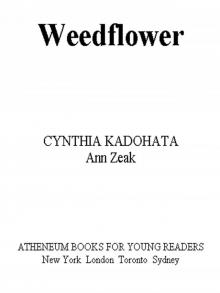 Weedflower
Weedflower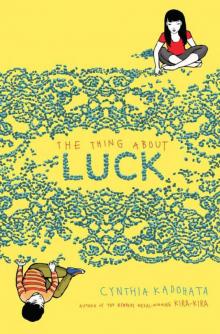 The Thing About Luck
The Thing About Luck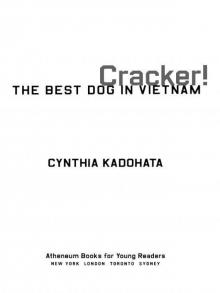 Cracker!: The Best Dog in Vietnam
Cracker!: The Best Dog in Vietnam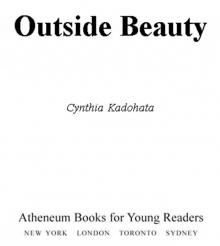 Outside Beauty
Outside Beauty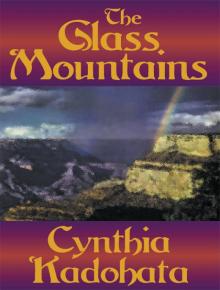 The Glass Mountains
The Glass Mountains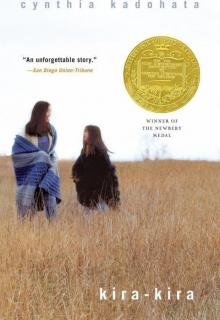 Kira-Kira
Kira-Kira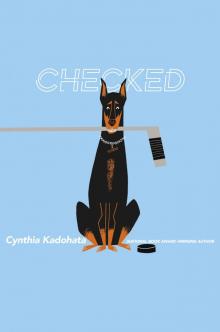 Checked
Checked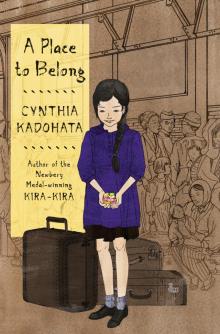 A Place to Belong
A Place to Belong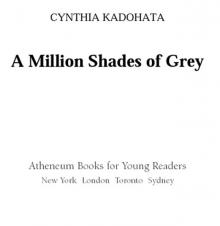 A Million Shades of Gray
A Million Shades of Gray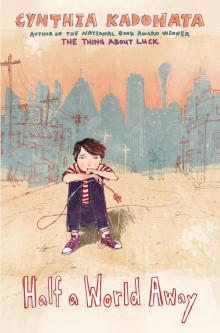 Half a World Away
Half a World Away